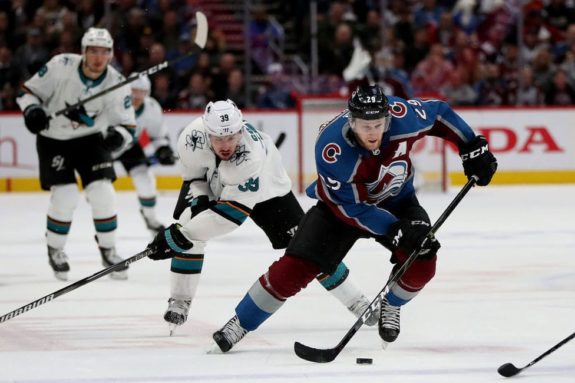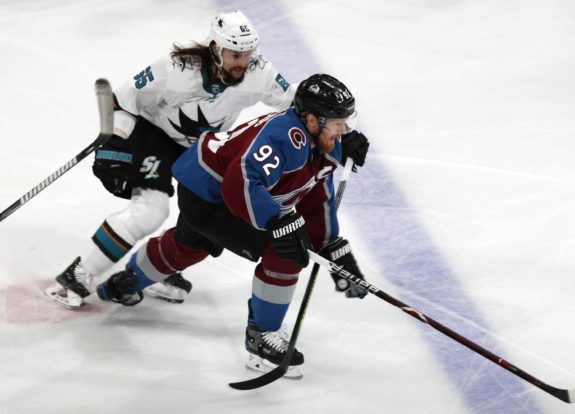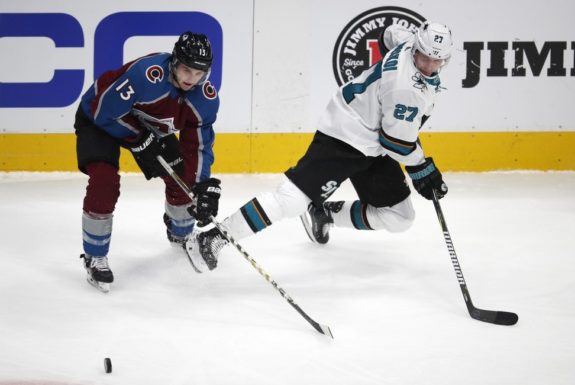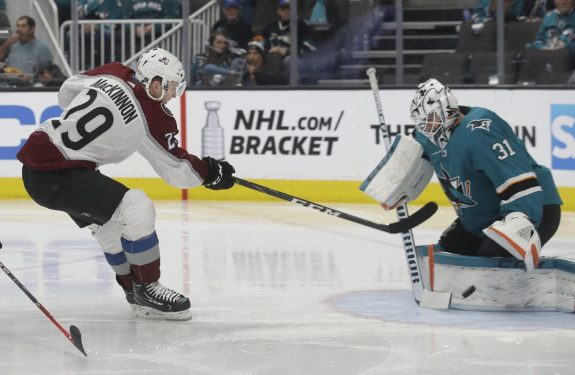It wasn’t easy or pretty and certainly not convincing, but the San Jose Sharks did enough to get by the Colorado Avalanche in their seven-game series.
The series finale proved intense, with the Sharks prevailing 3-2 on home ice.
Fortune in Game 7
The Sharks posted one of the more fortunate wins in playoff history in Game 7 of their first round series against Vegas, coming back from a 3-0 scoreboard deficit in the final period with four power play goals and ultimately winning in overtime.
Fortune favored the Sharks again against the Avs. Good fortune began before the game began with the return of Joe Pavelski to the lineup. For some, the return of the Sharks’ top goal scorer and team captain seemed more inspirational than anything else; whether Pavelski could play effectively was an open question. But Pavelski delivered more than an emotional lift. He scored the Sharks’ first goal by redirecting a Brent Burns shot six minutes into the opening period. Six minutes later, Pavelski went behind the net and fed Tomas Hertl for the score which put the Sharks up 2-0.

The Sharks seemed capable of putting the relatively inexperienced Avalanche away early. The Avs had other ideas. Mikko Rantanen deflected a Samuel Girard shot past Sharks netminder Martin Jones in the waning seconds of the first period to close the gap to 2-1.
Sharks Catch a Break, and Another, and Another
The Avs fans who felt their team deserved better, well, they have a point. In the opening period, their best player, heck the best player in the series, Nathan MacKinnon went out with what appeared as a shoulder injury just minutes into the game. Though MacKinnon would return about a dozen minutes later, he was almost certainly compromised.

If his shoulder was hurting, his legs were fine. At one point, a loose puck appeared to have breakaway written all over it. The speedy MacKinnon got ahead of Sharks defenseman Erik Karlsson, whose swiped MacKinnon’s legs and tripped him. But none of the officials seemed to think it was penalty and the Sharks dodged a major bullet, facing neither a MacKinnon breakaway nor an Avs power play.
The game’s most controversial moment came when the officials overturned an Avs goal due to an offsides which had nothing to do with the play. Team captain Gabriel Landeskog, leaving the ice and at the bench on the side opposite the play, had his foot barely, questionably, in the Sharks zone as the Avs entered with the puck on a two-on-one break. They appeared to cash in with forward Colin Wilson firing the puck past Jones. But the Sharks challenged and the subsequent review overturned the goal; the score remained 2-1 in favor of the Sharks.

The Avalanche’ Furious Push
For the second time this playoff season, the Sharks’ game-winning-goal in a Game 7 came off the stick of a fourth line player. This time, it was Joonas Donskoi scoring on a goal which was remarkably similar to his overtime game winner in the 2016 Stanley Cup Final. His goal, a dozen minutes into period two, put the Sharks up 3-1. Though the lead did ultimately hold up, it was anything but secure.

The Sharks dominated play in the opening period and got the better of the second period play, too. The final period was something completely different.
Tyson Jost got the Avalanche within a goal less than a minute into the third period to cut the lead to 3-2. For all intents and purposes, the entire period was played in the Sharks defensive end. In hindsight, the Avs could have skated six and left the net empty all period, given how little the Sharks were able to do offensively against the swarming Avalanche.
Jones, arguably the team’s best player in the series, proved the lone Sharks player to deliver a strong third period, allowing just the one score and stopping several dangerous attempts. In the end, the Sharks did just enough to survive.

The Better Team, Avs or Sharks?
Were the Sharks the better team? Maybe. The series was remarkably even and most games could have gone to either team. Between the heroic return of Pavelski, an overturned goal, a missed call on an Avs breakaway and a dinged up MacKinnon, plenty went against the Avs in Game 7. No one who saw final period of Game 7, with the Avs dominating all twenty minutes, would suggest the Sharks were even competitive with the Avs. Yet, the Avs are done and the Sharks move on.
The Sharks Improving
If there is more good news for the Sharks in all this, they might be getting better.
Donskoi missed the first four games of this series due to an injury suffered in the opening round. He contributed significantly in the last three games in this series.
Pavelski took a puck off the jaw in the opening game of the playoffs and was largely ineffective against the Vegas Golden Knights. Fifteen days after getting injured in Game 7 against the Golden Knights, he returned to the line-up and played his best game of the playoffs.
Defenseman Erik Karlsson continues to skate better as he moves further away from the groin injury which sidelined him for most of the second half of the season. He’s still been a liability far too often this postseason, but the more he can contribute, the better off the Sharks are.
Tomorrow’s Avs, Today’s Sharks
The Avalanche gave the Sharks everything they could and fell in a game which could have easily gone the other way. The prospects for the Avalanche in the years ahead are incredibly bright.
But this season, it is the Sharks who emerged and head to the Western Conference Final. They are healthier and likely better than they were at the start of either prior series. With the St. Louis Blues up next, the task won’t get any easier. One thing is clear, nothing comes easy for anyone in Sharks Territory.
Zeke’s Notes
• One can look at it either way. Both teams struggled on the power play or were excellent on the penalty kill. Neither team got much from their power play in the series. The Sharks scored just twice in the series with the man advantage but also gave up a short-handed score. Both teams were 0-3 in Game 7.
• In the NHL playoffs, it is considered an advantage to have more rest between series. There are a lot of things which have not gone as expected in this season’s playoffs, and this bit of common sense has also suffered. In the four second round series, the team with the least amount of time off between series won three of the four. The lone exception? The Blues.
• If it seemed the younger Avalanche repeatedly held an advantage later in games, the numbers bear it out. For example, Colorado scored 18 goals in the series. Just five in the first half of games, 13 in the second half.